1. Personalized Health and Fitness Advice
AI transforms smart mirrors into personal health coaches that deliver customized fitness guidance. By analyzing a user’s physical attributes (like body shape or posture) and biometric data, an AI-equipped mirror can suggest tailored workout plans and nutritional tips. These systems use computer vision to monitor exercise form in real time, providing feedback on posture or technique to prevent injury and improve effectiveness. Over time, the AI learns from the user’s performance and progress, adjusting goals and routines to keep them challenged. This personalized approach makes fitness training more engaging and accessible at home, much like having a virtual personal trainer on call.
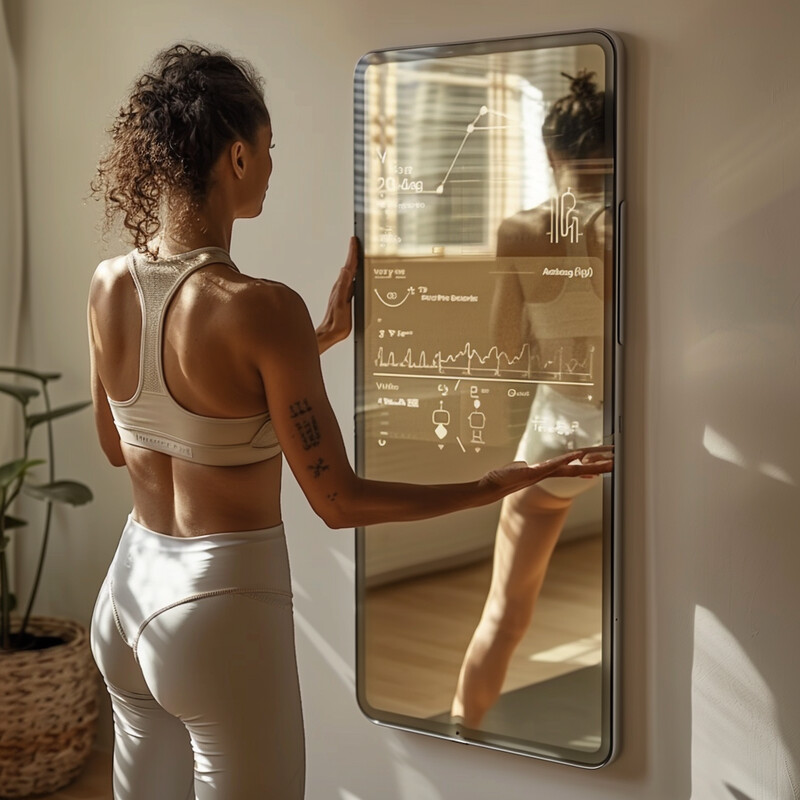
Research suggests that AI-driven fitness coaching can approach the effectiveness of human trainers for many individuals. For example, the American Council on Exercise found that intermediate exercisers achieved comparable results with personalized digital coaching as they did with traditional in-person training. In a recent report, a fitness app combining AI guidance with user data demonstrated significant weight loss outcomes, nearly matching those of programs with human coaches. The growing market reflects this potential: the global AI in fitness and wellness industry was valued at $9.8 billion in 2024 and is projected to reach $46.1 billion by 2034, indicating widespread consumer adoption of AI-powered fitness solutions. This shows that smart mirrors leveraging AI for health and fitness advice are grounded in effective techniques that can mimic real personal trainers in helping users meet their goals.
2. Skin Analysis
AI-enabled smart mirrors can serve as personal skincare analysts, evaluating the user’s complexion in detail and recommending targeted care. Using high-resolution cameras and computer vision algorithms, the mirror inspects skin for issues like wrinkles, blemishes, redness, or uneven tone. It objectively measures factors that human eyes might miss, such as pore size or subtle changes in skin texture. Based on this analysis, the AI suggests personalized skincare routines and products (for example, a moisturizer if it detects dryness, or vitamin C serum for dullness). Over repeated use, the system can track improvements or emerging concerns, allowing users to adjust their regimen proactively. This dynamic, AI-driven approach turns the daily mirror glance into a dermatological check-up, promoting healthier skin through early detection and customized advice.
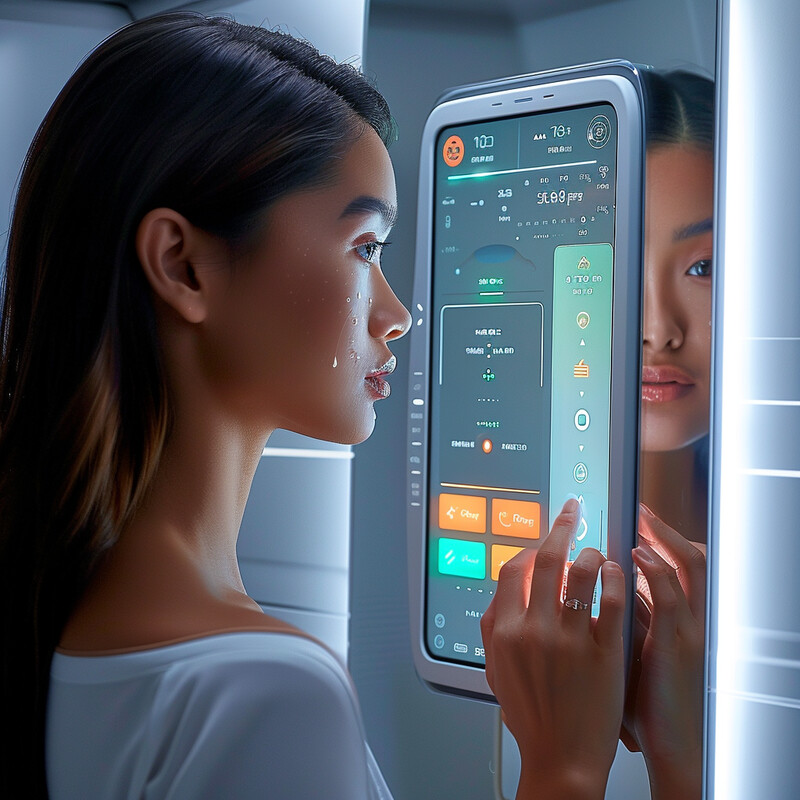
AI has proven remarkably adept at analyzing skin images with high accuracy. An IEEE study in 2023 showed that AI systems could classify skin conditions from photographs with over 85% accuracy, significantly outperforming average consumers’ self-assessments of their own skin. This level of accuracy means an AI-equipped mirror can identify fine details – like slight changes in pigmentation or emerging acne – that people often overlook. Dermatology researchers note that such AI tools can reliably detect issues ranging from wrinkles to early signs of skin diseases, bridging the gap between at-home observation and professional evaluation. By leveraging large datasets of skin types and conditions, AI skin analysis provides recommendations with a scientific basis. Users benefit from evidence-based tips (for instance, noting if their skin is oilier than they thought and suggesting non-comedogenic products) delivered in real time. The integration of AI thus makes skin-care advice from smart mirrors both highly personalized and grounded in dermatological data, improving users’ ability to care for their skin effectively.
3. Fashion and Style Recommendations
In the fashion domain, AI-equipped smart mirrors act like personal stylists. They can suggest outfits by analyzing the user’s wardrobe, body shape, and even the context (such as weather or occasion). These mirrors keep track of current fashion trends and the user’s past style choices to propose clothing combinations that flatter the individual’s figure and align with their preferences. For instance, the AI might recommend a particular jacket-pant pairing from your closet for an upcoming meeting, or suggest accessories to complete an ensemble. By virtually “mix and matching” clothes on the mirror’s display, users can see how different pieces look together without trying them on physically. This not only makes daily dressing more efficient but also introduces users to new styles they might not have considered. Overall, AI brings a data-informed yet creative approach to dressing, making fashion advice more accessible and personalized at home.
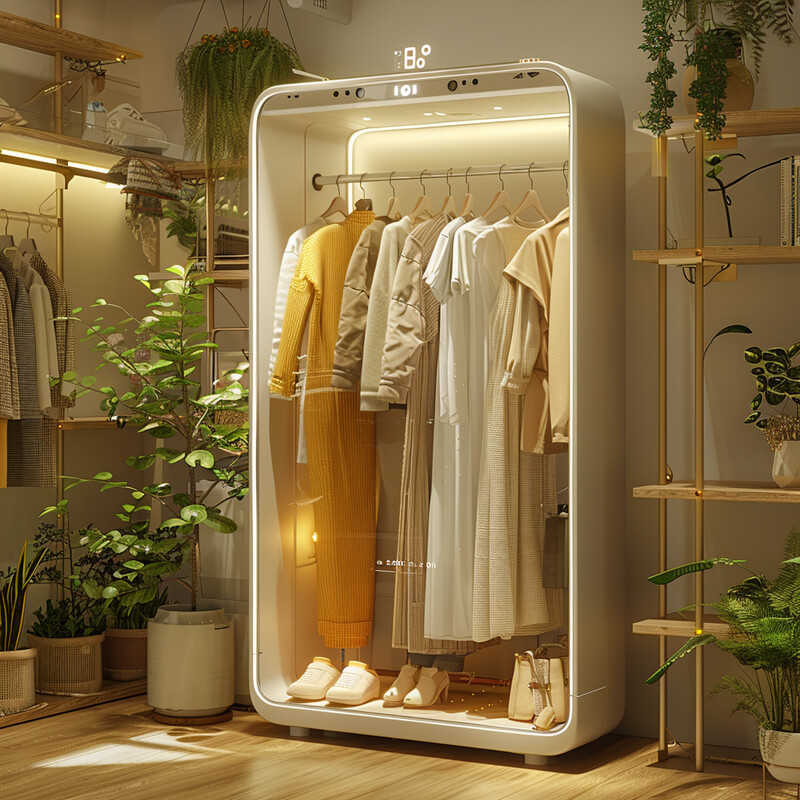
Consumers are increasingly open to AI-driven fashion assistance, reflecting trust in technology’s styling advice. A global survey in 2023 found that over half of shoppers (approximately 50–60%) are willing to use AI for everyday purchase decisions like choosing clothing or beauty products. This indicates a major shift in comfort with AI in personal style choices – where once people might have relied solely on friends or magazines, many now welcome algorithmic suggestions. In practice, retailers have noted higher customer engagement when AI styling tools are available: personalized outfit recommendations can increase browsing time and satisfaction. Moreover, early data show that AI-driven style platforms can reduce return rates, as customers are more confident that an AI-recommended item will suit them. Fashion brands from fast fashion to luxury are investing in AI styling aids, and some stores have even installed smart mirrors that use AI to recommend clothes in fitting rooms. The willingness of a majority of consumers to accept AI advice underscores the effectiveness of these smart mirror style recommendations – people are finding that AI can indeed help them look their best.
4. Virtual Makeup and Hair Styling
AI-powered smart mirrors enable users to virtually try on different makeup looks and hairstyles in real time. Through augmented reality, the mirror overlays digital makeup (like eyeshadow, lipstick, or blush) onto the user’s reflection with realistic color and texture. Similarly, it can simulate haircuts or hair colors without any physical change. This allows someone to experiment with bold new looks – for example, seeing how they’d appear with a short bob and smoky eye makeup – instantly, without the mess or commitment. It’s an engaging way to explore styles before deciding to apply products or visit a salon. The AI ensures the virtual makeup stays aligned with the user’s facial features as they move, and adjusts hairstyles to fit their head shape. Virtual styling is not only fun but also practical: users can discover what products or styles suit them best, avoid potential cosmetic mismatches, and even save money by only purchasing products that they’ve seen complement their look in the mirror’s preview.

The impact of virtual try-on technology on beauty and fashion sales is significant, demonstrating its effectiveness. More than 75% of consumers are interested in AR-powered shopping experiences, and a remarkable 90% of Gen Z customers expressed enthusiasm for using augmented reality to virtually try on makeup and hair products. This high engagement translates into tangible results for businesses: for instance, when the beauty brand Avon implemented an AI-driven virtual makeup try-on, they saw a 320% increase in conversion rate (online shoppers were over three times more likely to purchase) and a 33% rise in average order value among those who used the feature. These figures, reported by Avon’s CEO, highlight how seeing a realistic preview instills confidence in buyers – users are far more inclined to buy a lipstick or hair dye once they’ve virtually seen it on themselves. Other major cosmetics retailers have noted similar boosts, with virtual try-ons leading to significantly higher customer satisfaction and lower return rates. The strong consumer interest and proven sales uplift underscore that AI-powered virtual makeup and hairstyling is not just a gimmick, but a valuable tool in the beauty industry.
5. Gesture Control
AI allows smart mirrors to be operated touch-free through simple hand gestures. Instead of physically tapping a screen (which might be inconvenient if your hands are wet or dirty), you can wave or make specific motions to navigate the mirror’s interface. For example, swiping your hand in the air to turn a page of a recipe, or holding up a palm to pause a video. The AI uses image recognition to interpret these gestures accurately – it “sees” the user via a camera and maps the movement of their hands or body to commands. This hands-free interaction makes using the mirror more hygienic (no smudges on the glass) and seamless, especially in scenarios like applying makeup or cooking where touching the device is impractical. It also improves accessibility for users who might have difficulty with touch controls. By recognizing a range of gestures (e.g., a clockwise motion to adjust volume or a thumbs-up to confirm a selection), the smart mirror becomes an intuitive device that you control with a wave of the hand, much like the touchless systems seen in futuristic movies.

The adoption of AI for gesture recognition is rapidly growing, reflecting its importance in next-generation interfaces. Industry projections estimate that by 2025, about 45% of all gesture-controlled systems will incorporate AI to enhance accuracy and responsiveness. Integrating AI has been shown to vastly improve a system’s ability to correctly interpret human movements in real time – for instance, modern AI-driven gesture platforms can achieve recognition accuracies above 95% in lab settings, whereas older non-AI systems were more error-prone. The push for touchless technology has also been accelerated by health and convenience factors; during the COVID-19 pandemic, interest in no-contact interfaces (like elevator panels or display screens) surged. This trend carries into smart homes: the global gesture recognition market was valued at nearly $19.8 billion in 2023, and is expected to grow over 20% annually, partly fueled by demand for AI-enhanced home devices. Whether in cars, gaming, or smart mirrors, AI is becoming essential for interpreting gestures reliably. Users benefit from this with more natural and frustration-free control – a wave or nod is correctly understood, thanks to machine learning models trained on countless human movements. In short, AI is making gesture control a viable and popular option for interacting with devices, as evidenced by its fast-rising integration across products.
6. Augmented Reality Shopping
Augmented reality (AR) shopping through smart mirrors lets users virtually try on clothing and accessories as if they were in a fitting room, all within their home. AI plays a role by realistically overlaying chosen apparel onto the user’s mirror reflection – if you want to see how a particular dress or suit looks on you, the mirror’s display will show that garment moving with your body in real time. The AI ensures the fit and sizing appear accurate and can even simulate fabric drape and lighting. This helps in making online shopping more informed: users gain a clear idea of how an item would look on them before buying. It reduces the guesswork with sizes or styles, potentially decreasing the likelihood of returns due to poor fit. Additionally, these smart mirrors often integrate shopping features (like showing the price or stock availability of the item you’re “wearing” and allowing you to order it via voice command). By bringing the retail try-on experience to one’s home, AI-driven AR mirrors make shopping more interactive and personalized, blending convenience with the confidence of seeing a virtual “mirror image” of oneself in prospective outfits.

The rise of virtual try-on technology is evident in market trends and its touted benefits for both consumers and retailers. In 2023, the global virtual try-on market (covering AR clothing and accessory try-ons) was estimated at $9.17 billion, and it is forecast to grow at a rapid 26.4% annual rate from 2024 to 2030. This surge is driven by shoppers’ desire for more immersive and confident online shopping experiences. Notably, augmented reality try-ons can significantly cut down return rates – by letting customers see an item on themselves, they are less likely to order incorrect sizes or styles, saving retailers costly returns (online apparel returns historically hover around 30% of purchases, a number AR aims to reduce). Retail executives have embraced this technology: in one 2024 retail survey, a large share of experts identified virtual fitting rooms as one of the most effective applications of AI in retail, bridging the gap between e-commerce and the in-store experience. Companies report that customers who use AR mirrors or apps to try on clothes are more satisfied with their purchases and more likely to buy additional items. The strong market growth and these positive outcomes underscore how AI-powered AR shopping is transforming retail – making online shopping more like an interactive, personalized showroom for each customer.
7. Ambient and Mood Lighting
AI in smart mirrors can adjust the surrounding lighting to create the ideal ambiance for the user’s needs or mood. By using light sensors and even analyzing the user’s face (for cues about alertness or relaxation), an AI-enabled system modulates the mirror’s illumination and connected room lights. For example, early in the morning it might gradually increase brightness to simulate a natural sunrise effect that gently energizes the user, whereas at night it could shift to warmer, dimmer tones to promote relaxation. The AI can also respond to voice commands like “I’m feeling stressed,” by dimming the lights and perhaps adding a soft hue to soothe the environment. Essentially, the mirror becomes a smart lighting hub that not only provides optimal lighting for seeing oneself (important for tasks like makeup application) but also enhances the overall atmosphere of the room. This leads to a more comfortable experience – bright, cool light when you need to be alert, and soft, warm light when you want to unwind – all automatically delivered by the system’s understanding of time, context, and user preference.

Scientific research has established that lighting conditions have a profound effect on human mood, alertness, and health, which validates the importance of AI-driven ambient lighting adjustments. Exposure to bright, natural-spectrum light during the day helps maintain our circadian rhythm, improving sleep quality and daytime vitality. For instance, a 2021 study published in a health journal found that increasing daylight exposure inside homes helped people fall asleep faster and feel more energetic during the day. Similarly, a 2022 study showed that incorporating ample natural light throughout various rooms significantly improved residents’ emotional well-being. Lighting experts recommend mimicking these natural patterns: cool, blue-white light in the morning to boost concentration, and warmer, dimmer light in the evening to signal the body to wind down. Modern smart lighting systems use these principles by automatically adjusting color temperature over the day – a task well-suited for AI. By following a programmed “lighting schedule” informed by research, an AI mirror can, for example, brighten to a crisp white light in the morning to help you wake up, then transition to a calm amber glow at night. Users have reported reduced eye strain, better moods, and smoother wake/sleep cycles when using such dynamic lighting. In summary, AI-coordinated ambient lighting is backed by research showing tangible mental and physical health benefits, as it delivers the right light at the right time for our well-being.
8. Sleep and Wake-Up Features
AI-enhanced smart mirrors can also function as intelligent alarm and sleep aids. By analyzing sleep patterns (often via connected wearables or sensors in the bedroom), the mirror’s AI can determine the optimal time and method to wake the user. Instead of a jarring alarm sound, it might gradually brighten its display or the room lights to simulate dawn, sometimes complemented by gentle audio like soft music or nature sounds – all aimed at a more natural wake-up process. This gradual approach helps reduce sleep inertia (that groggy feeling upon sudden waking). At night, the mirror can do the reverse: dimming lights and displaying calming visuals or playing soothing sounds as the user prepares for bed, supporting a wind-down routine. Some smart mirrors might even give feedback on last night’s sleep quality or relaxation tips if the AI detects stress. By integrating with the user’s sleep schedule, an AI smart mirror essentially serves as a personalized sleep coach and an alarm clock that adjusts to one’s circadian rhythm. The result is that users wake up feeling more refreshed and start their day with customized motivational messages or schedule highlights on the mirror, all orchestrated by AI for an optimal daily cycle.

Waking up with gradual light and sound, as provided by AI smart mirrors, is more than just a nice feeling – it’s backed by research showing clear benefits for morning alertness. Clinical studies on simulated dawn wake-ups have found that slowly increasing light before and at the alarm time can significantly improve how people feel and perform upon awakening. In one controlled trial, participants who were woken by a 30-minute “sunrise” lamp reported higher perceived sleep quality and greater morning alertness compared to those with a typical abrupt alarm. Objective tests in the same study showed faster reaction times and better cognitive performance after wake-up for the dawn light group, indicating that this method reduces grogginess and jump-starts the brain more gently. Another related study noted that exposure to dawn simulation light can trigger the body to suppress melatonin (the sleep hormone) more gradually, aligning the wake-up more closely with the body’s natural rhythm. These findings explain why devices that simulate sunrise – often called wake-up lights – have grown in popularity. By incorporating AI to control lighting, sound, and timing based on individual sleep data, smart mirrors build on this science to make mornings easier. Users commonly report feeling more energetic and less inclined to hit “snooze” when using such AI-driven wake-up features, confirming what the research shows: a gentle, biologically informed wake-up is a healthier start to the day.
9. Interactive Entertainment and Connectivity
Smart mirrors with AI serve as information and entertainment hubs that keep users connected without needing to pick up a phone. Through voice recognition (and sometimes touch or gesture), users can ask the mirror to show the latest news headlines, weather forecasts, calendar appointments, or social media updates on the mirror’s display as they get ready. Essentially, the mirror doubles as a smart display – one moment you’re brushing your teeth, and in a corner of the mirror you’re seeing today’s temperature and rain probability, perhaps with an AI voice reading the top news. You can stream music or podcasts through built-in speakers by just saying a command like “Play morning news” or “Open my Spotify playlist.” AI handles the language understanding and personalization, knowing, for example, that if you say “Show me my commute,” it will pull up a traffic map for your usual route. Additionally, these mirrors often integrate with other smart home devices (thanks to AI assistants like Alexa or Google Assistant), so you could check who’s at the door via a connected doorbell camera feed or adjust your smart thermostat by asking the mirror. All of this makes the morning or evening routine more efficient – information flows to you proactively. The AI ensures that content is relevant (learning your preferences over time) and that voice commands are accurately recognized, enabling a truly interactive, connected experience while you’re in front of the mirror.
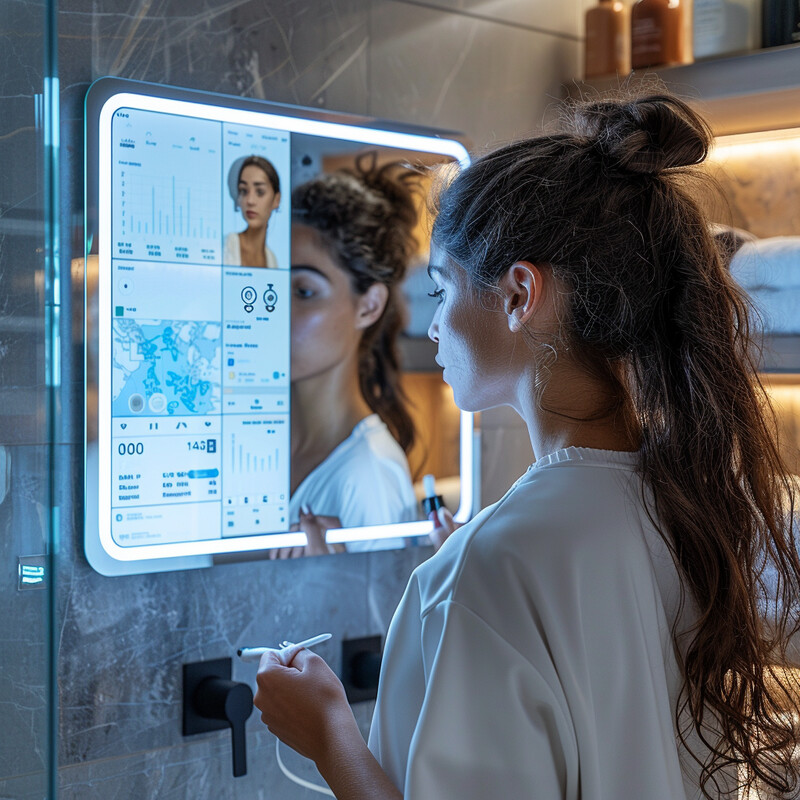
The prevalence of voice-activated smart devices has skyrocketed, illustrating consumers’ comfort with AI-driven assistants for news and daily tasks. As of 2022, 35% of American adults owned a smart speaker (like an Amazon Echo or Google Nest) equipped with a voice AI, a figure that has been climbing each year. By that time, 62% of U.S. adults were using voice assistants on some device regularly, whether through phones, speakers, or in-car systems. This widespread adoption shows that millions are already getting their weather updates, music, and other info via AI voice interfaces. Smart speaker users, for example, often start their day by asking for news briefings or controlling smart home functions hands-free. Surveys also reveal that once people have these AI helpers, they integrate them into daily routines – in 2022, over half of voice assistant users interacted with them every single day. This trend extends to smart displays (speakers with screens) that can show visual info like calendars and videos. By bringing similar AI capabilities to mirrors, manufacturers are tapping into an established behavior: using voice and AI to stay connected and informed. In essence, a smart mirror just places that convenience in front of you while you prepare for the day or wind down at night. Given that more than one-third of Americans already trust AI for their morning news and home controls, it’s no surprise that smart mirrors are emerging as the next interface for our connected lives, offering the same functionalities in a seamless, reflective form.
10. Security and Surveillance
In the security domain, AI turns smart mirrors into vigilant guardians of the home. Some smart mirrors come with built-in cameras and facial recognition software, enabling them to recognize familiar faces (like family members) versus strangers. When integrated into a home security system, the mirror can effectively function as an extra surveillance camera – one that not only shows who’s in its view but uses AI to interpret the scene. For example, if someone unfamiliar enters the room, the AI can trigger an alert or display a notification on the mirror (or send it to the homeowner’s phone). It might even greet recognized individuals by name and refuse to show sensitive information on the screen if it detects an unknown person looking at the mirror. Beyond facial recognition, the AI can also listen for unusual sounds (glass breaking, alarms) or detect motion when the house is supposed to be empty. In essence, the mirror doubles as a discreet security sensor: when you’re home, it’s a normal mirror; when you’re away, it watches over the space. This dual purpose enhances home security without adding obvious cameras in every corner. AI’s ability to analyze video feeds in real time means the mirror can differentiate between, say, a pet moving around versus an intruder, reducing false alarms. Overall, AI empowers smart mirrors to contribute to home surveillance, providing peace of mind by monitoring and alerting to potential threats in an intelligent, automated way.
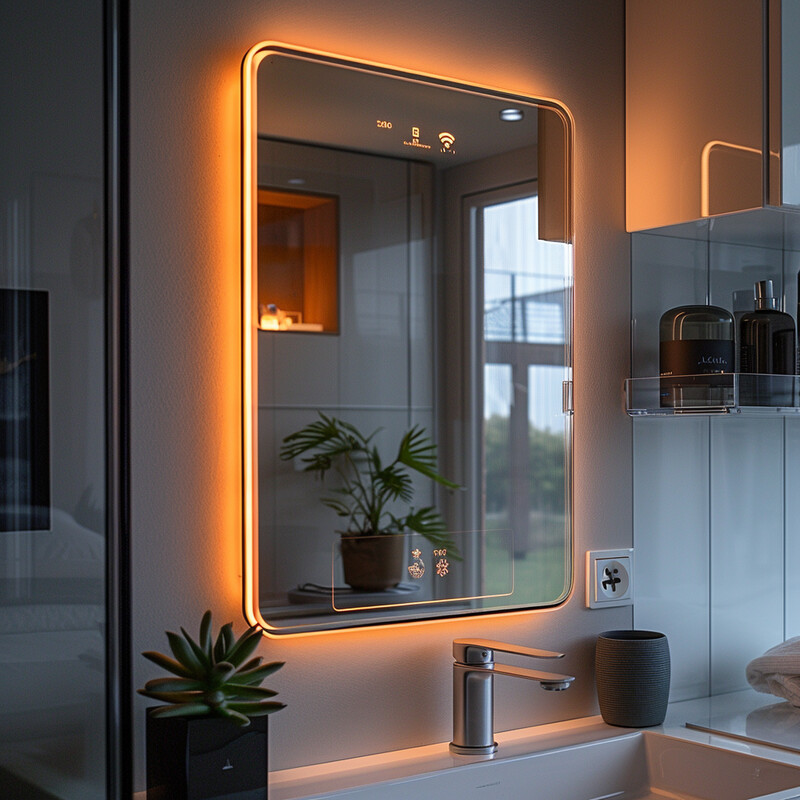
AI-enhanced security cameras and systems are becoming standard in homes, as evidenced by their surging usage. In 2024, it was reported that over 50% of U.S. households have at least one security camera as part of their home protection setup. These cameras increasingly come with AI features – for instance, popular models can detect humans (versus animals or rustling leaves) and some can recognize known faces to differentiate family from intruders. The market for AI-driven video surveillance is expanding rapidly in line with this trend. In 2023, the global market for AI in video surveillance (which includes smart home security cameras with AI analytics) was valued at around $5.74 billion, and it’s projected to grow at an impressive 28% compound annual growth rate through 2030. This growth reflects how common intelligent security cameras have become – consumers and businesses alike are deploying devices that don’t just record footage, but actively analyze it with AI. Law enforcement and safety experts note that AI-based alerts can significantly cut response times, since the system can instantly flag a “person detected” or a specific face, rather than relying on someone to watch hours of video. For homeowners, this means smarter alarms: your system might tell you “Unknown face at the front door” instead of a generic motion alert. As half of all homes now embrace smart security gear, integrating those capabilities into devices like mirrors is a logical next step. It leverages the proven accuracy of modern AI vision (which in good conditions can exceed 95% accuracy in recognizing individuals) to provide security that is proactive and personalized.